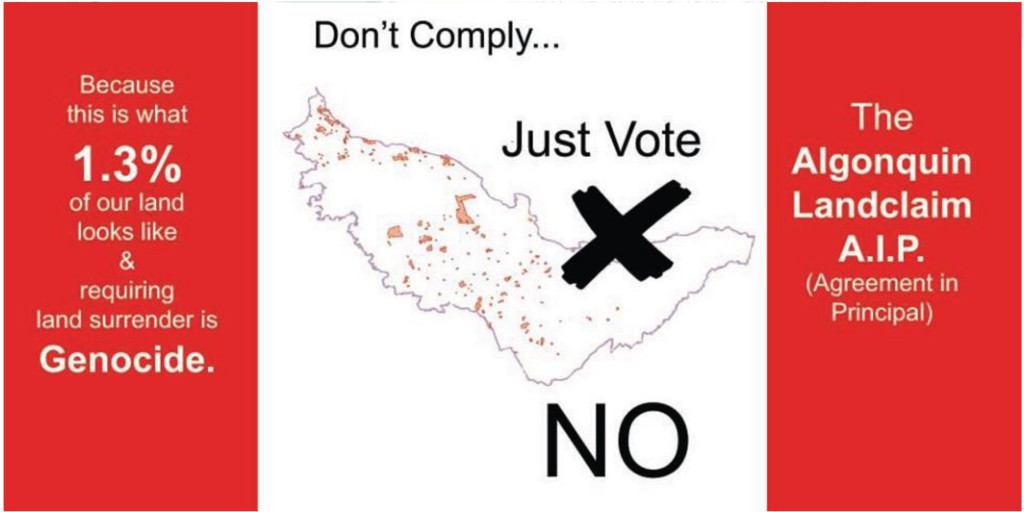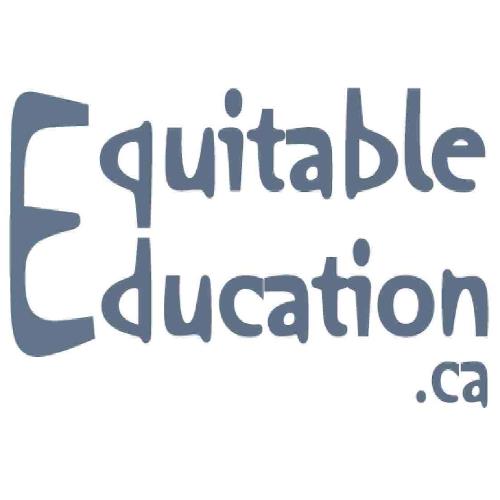A summary and download of a letter from Heather Majaury to the Algonquins of Ontario organization; an in-depth critique of the Proposed Agreement-In-Principle that will be voted on in the coming months. The letter is cc’ed to relevant provincial and federal government representatives and ministers. Scroll down for context, summary and links, also with related resources at the bottom.
Note on title terminology: “The termination tables are negotiation tables between the Federal Government and mainly First Nations Chief and Councils. These negotiations are called “Comprehensive Land Claims” and/or “Self-Government” negotiations, the final agreements will — within Canadian constitutional law — extinguish Aboriginal Title and convert “Indian Bands” into municipal type governments where federal and provincial powers will dominate First Nations powers.” – from Idle No More website

Heather Majaury is an Enrolled Non Status Algonquin Anishinaabe-kwe of mixed ancestry from the Ottawa River Valley. She has been a working actor, singer, song writer, director, playwright, and popular theatre worker for over 25 years. She served in 2001 as Communications Officer as part of the Land claim Negotiation Team located at Pikwakanagan Reserve. At the time, the staff were employees of the Algonquin Nation Negotiation Directorate, an Ontario Corporation that handled and processed all land claim funding until negotiation broke down in 2002, prior to the forming of the current Algonquins of Ontario negotiating body. Her website is www.HeatherMajaury.com
The ‘Algonquins of Ontario’ (AOO) was created in 2006 as an organization to carry out the land claims process; the AOO decision-making body consists of the chief and six council members of the Algonquins of Pikwakanagan First Nation, along with one elected ‘Algonquin Negotiation Representative’ (ANR) for each of the nine non-status Algonquin communities included in the claim. This land claim process was initially started by Pikwakanagan in 1983, with the provincial and federal governments accepting the claim to negotiate in 1991 and 1992 respectively.
The land under negotiation (click for map) has never been ceded or surrendered. It consists of approximately 36,000 square kilometres of eastern Ontario (although unceded Algonquin territory does not stop at the Quebec border): the southern boundary goes from North Bay in the northwest, southeast almost all the way to Kingston, and then northeast to Hawkesbury, with Brockville and Cornwall excluded. The northern boundary is the Ottawa River aka the provincial border; the city of Ottawa is included in this territory, as is almost all of Algonquin Park.
Majaury’s letter includes a list of 18 points as to why the current Proposed Agreement-In-Principle should be rejected. These points include:
- An unsatisfactory one-time “buy out” amount of $300 million, with no ongoing revenue streams or revenue-sharing agreements concerning the territory’s natural resources or land, nor any recompense for the hundreds of years of damage, pain and suffering inflicted upon many generations of Algonquin people.
- “Microscopic” amounts of ‘fee simple’ land; only 117,500 out of approximately 9 million acres.
- The comprehensive land claims process not being acceptable under international legal standards, not including Algonquin Anishinabeg language and legal concepts, and lacking engagement from many of the enrolled Algonquin people.
- The issue of the debt incurred by the Algonquins to participate in the process with no way to pay it off other than from the money in the final settlement.
- Lack of recognition of the overlapping land title and rights of other Algonquins who are not included in the negotiations.
- Indemnity of the Canadian state from any actions taken in advance of the final agreement that have or will have violated the Algonquins’ constitutional Section 35 rights; and no mention of Section 25 protections.
- Lack of agreements to ensure proper ongoing genealogy, enrolment, housing, education, and affirmative employment action; inadequate agreement on hunting rights and jurisdiction.
- The issue of the sacred Chaudiere Falls site in Ottawa being treated as private land, the proposed condominium development (the ‘Zibi’ project by Windmill Development Corp), and the vision of the late Algonquin Elder William Commanda for the site.
Read all 18 points and the letter in its entirety:
—- click here for 7-page PDF file —-
—
Related resources:
- “First Nations finance their own demise through land claims process”
An article co-written by Heather Majaury and Lynn Gehl about the Algonquin land claim process, published on Ricochet Media (Feb 2014)
- Official sites on this land claims process from each of the three parties involved:
– Algonquins of Ontario page
– Ontario government page
– Federal government (Aboriginal Affairs) page
- Book by Lynn Gehl: “The Truth that Wampum Tells: My Debwewin on the Algonquin Land Claims Process” (2014, Fernwood Publishing)
– also review of the book in Frontenac News, by Jeff Green
– and see article by Gehl: The heart break of Algonquin genocide (2013)
- Eastern Ontario Land Claim – Algonquin Treaty Negotiation Funding Trust Financial Statements For the year ended 31 March 2015
- Interview with policy analyst and Algonquin Nation Secretariat advisor Russell Diabo on this land claims process (Feb 2015) mp3 file link — Webpost with audio & transcript
(with correction: 6,000 non-status enrolled members, not 16,000)
- Book by Bonita Lawrence, “Fractured Homeland: Federal Recognition and Algonquin Identity in Ontario” (2012, UBC Press)
– also, video from book launch in Ottawa, featuring Bob Majaury, Verna McGregor, Bob Lovelace
—
 Interdependent media & in-person learning opportunities for those who are inspired to be part of movements for social justice.
Interdependent media & in-person learning opportunities for those who are inspired to be part of movements for social justice.
they should not enter negotiations with the federal and prov. govt’s. The land is clearly their’s with overlaps with Haudensaunee. They should enter the negoatiations from a position of pwer; these lands are theirs’, and the Canadian gov’t just took them without any real compensation, except to set up ‘reserves’, which were a miniscule portion of the original landbase. It’s a shame. I hope the Anishinabe Peoples all get together, and stick it to the colonials, once and for all. Don’t take their money; take the land back.